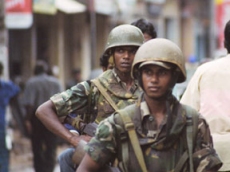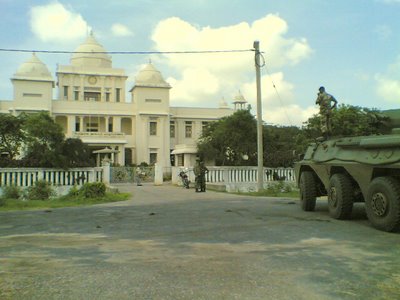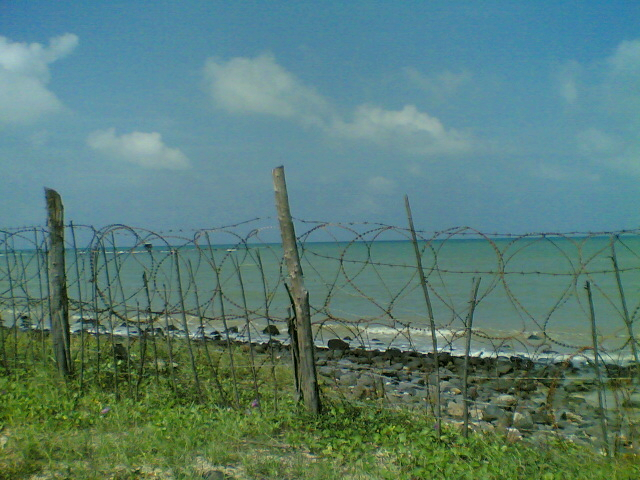Descending fast from over the Indian Ocean, the Russian-made transport plane banks hard, its wing almost clipping the jungle canopy below. Flares pump out the back to fool any heat-seeking missile.
Upon landing, it is the army's turn to take no chances -- this time with foreign journalists flown in to be shown how the government is winning both the war and the hearts and minds of Jaffna's "liberated" Tamils.
To keep the press on-message, private conversation with the locals was strictly prohibited.
But what the army did deliver was a slick slideshows and sweet tea and biscuits, stomach-turning photos of alleged victims of the Tamil Tigers and heart-warming video clips of delighted and supposedly local school children.
"As you can see, these children are very happy, because they have been liberated from terrorism," an officer said, reading from a script within a bunker complex.
An easy-listening piano score provided the soundtrack to today's Jaffna peninsula, home to around 600,000 ethnic Tamils and their 38,000 ethnic Sinhalese guardians.
It's a happy place -- according to the army -- even though the Liberation Tigers of Tamil Eelam (LTTE) rebels are only down the road, and even though rights groups speak of a place of fear, murders and disappearances.
The officer confirmed that outside his huge military base there was a 9:30pm to 4:30am curfew, but added that this was of no nuisance whatsoever to the locals "who are normally asleep at that time."
"Anyone who wants to move around after curfew is a robber or a terrorist," he said.
A request for an unaccompanied trip into town did not go down well, with the army warning the LTTE would kill AFP's journalists and blame the government.
Instead, a trip was permitted in the army's transport of choice: a thick metal box on a truck chassis where the only view of the supposedly delighted locals was through tiny holes shaped for muzzles of assault rifles.
 Providing the escort was a 130-kilogram (290-pound) major, who looked like he could snap a man in two with his bare hands. He was backed by a contingent of troops, each with a gun, flak jacket, helmet and nervous grin. Providing the escort was a 130-kilogram (290-pound) major, who looked like he could snap a man in two with his bare hands. He was backed by a contingent of troops, each with a gun, flak jacket, helmet and nervous grin.
In Jaffna city, the town commandant provided another exhaustive list of LTTE crimes and violations of a now-dead 2002 ceasefire -- ranging from blowing civilians to bits to preventing children from going to the library.
"But we have ourselves a victory in winning hearts and minds," said Jaffna's boss, Brigadier Ruwan Kulathunga.
The only slight impediment to this, he said, was the fact that almost none of the troops on the peninsula could speak the local Tamil language.
A trip into town was next on the tour, with the burly major offering to find "happy local people" who are fed by supplies brought in by plane and ship.
However, a brief moment of relative privacy was to be found with a Tamil shopkeeper who spoke some German: "It's terrible here. Everyone is scared. I can't talk to you," he said hurriedly, before ducking back into his store.
Two men also whispered "Prabhakaran!" -- the name of the reclusive leader of the LTTE who was born in Jaffna -- as they passed by and were out of earshot of the troops.
Informed of this later, one of the army escorts explained that "hardcore terrorists" were still around.
"What did they look like?" he asked.
According to Sri Lanka's hardline defence secretary, Gotabhaya Rajapakse, there is little point talking to the locals anyway. The press is also banned from travelling to the LTTE-held north.
"You will hear complaints about disappearances," he said in Colombo, the capital. "What they won't say is that these so-called missing people are terrorists who may have died on the frontline or are in LTTE territory."
 So with local people off-limits, a trip to the frontline was promised -- only to be refused after another bruising ride in the metal box on wheels across the 50 by 30 kilometre (30 by 19 mile) part peninsula held by the government. So with local people off-limits, a trip to the frontline was promised -- only to be refused after another bruising ride in the metal box on wheels across the 50 by 30 kilometre (30 by 19 mile) part peninsula held by the government.
But Brigadier Kamal Gunaratne, in charge of the front, said his men had "extremely high morale" and the LTTE fighters "know they are losing" after 35-years of a separatist war that has left 60,000 dead.
With at least one soldier for every 50 metres (yards) of main road, the LTTE would certainly have a tough time recapturing the Tamil heartland they lost in 1995.
"At the rate we are going, I think that in about two to three more years we'll be able to bring them to the negotiating table. First we have to eliminate their leadership," Gunaratne said.

A trip to the rich fishing grounds south of Jaffna town, just three kilometres from LTTE territory to the south, was allowed after negotiation.
There, the lagoon is lined with barbed wire and more soldiers camped out in the ruins of beachfront villas.
No fishermen were to be seen, and the only sound was the lapping of waves, the thump of outgoing artillery, and the distant rumble of explosions in the Tamil Tiger-held jungle across the bay |
 Home
Home Archives
Archives Home
Home Archives
Archives